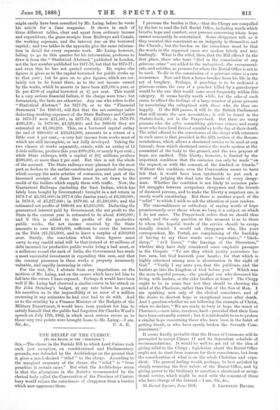THE RELIEF OF THE CLERGY.
[TO THE EDITOR OF THE " SPECTATOR. 1 Sia,—The clause in the Burials Bill to which Lord Cairns took such just exception, on constitutional and Parliamentary grounds, was defended by the Archbishops on the ground that it gives a much-desired " relief " to the clergy. According to the marginal summary of the clause, the " relief " is " from penalties in certain cases." But what the Archbishops mean is that the alterations in the Rubrics recommended by the clerical body called the Convocation of the Province of Canter- bury would relieve the consciences of clergymen from a burden which now oppresses them. I presume the burden is this,—that the Clergy are compelled by the law to read the full Burial Office, including words which breathe hope and comfort, over persons concerning whom hope cannot reasonably be entertained. Some clergymen talk as if they resented this constraint as an indignity to themselves and the Church ; but the burden on the conscience must be that the words in the supposed cases are spoken falsely and mis- leadingly. What is the relief, then, that the Bill offers P In the first place, those who have " died in the commission of any grievous crime" are added to the uubaptised, the excommuni- cate, and suicides, as persons for whom the Burial Office is not to be used. To die in the commission of a grievous crime is a rare occurrence. Now and then a house-breaker loses his life in the act of burglary. Perhaps, if poaching is to be reckoned a grievous crime, the case of a poacher killed by a gamekeeper would be the one that would come most frequently within this category. It seems hardly worth while, for the sake of such cases, to offend the feelings of a large number of pious persons by associating the unbaptised with those who die thus un- happily. If the Bill passes, it will be the British Parliament that will create the new association ; it will be found in the Statute-book, not in the Prayer-book. But there are many persons who die after committing grievous crimes, and many more who have lived lives of scandal up to the day of their death. The relief offered to the consciences of the clergy with reference to such cases is that provided in the fifth section of the Recom- mendations, which allows a shortened service to be used at any funeral; from which shortened service the words spoken at the committal of the body to the ground, and the two prayers of hope, are omitted. This liberty, however, is limited by the important condition that the omission can only be made "on the request, or with the consent, of the kindred or friends." Without this condition, even the Convocation seems to have felt that it would have been intolerable to put such a power of judging the dead into the hands of every clergy- man. Whether the condition is not likely to occasion pain- ful struggles between scrupulous clergymen and the friends of deceased persons, and to make the liberty a nugatory one, is surely worth considering. But there is another aspect of the " relief " to which I wish to ask the attention of your readers.
The reasonableness or orthodoxy of saying words of hope promiscuously over those whom we bury is a subject on which I do not enter. The Prayer-book orders that we should. thus speak, and the only question at this moment is as to those to whom the hopeful words of the service should be excep- tionally denied. I would. ask clergymen who, like your correspondent, Mr. Portal, are complaining of the hardship of having to say these words over " reprobates," " black- sheep," " evil livers," " the leavings of the Dissenters," whether they have duly considered some emphatic passages in the Gospels. "Ye are they which justify yourselves be- fore men, but God knoweth your hearts ; for that which is highly esteemed among men is abomination in the sight of God." " Verily I say unto you, that the publicans and the harlots go into the kingdom of God before you." Which was the more hopeful person,—the prodigal son who devoured his living with harlots, or the elder brother at home ? The Clergy ought to be in some fear lest they should be showing the mind of the Pharisees, rather than that of the Son of Man. I am speaking now only of the clerical conscience, and of the desire to disavow hope in exceptional cases after death. And I question whether we are following the example of Christ, when we declare, " We are ready to bury in hope the worst of Pharisees,—men false, covetous, hard—provided that their lives have been outwardly correct ; but it is intolerable to us to profess a similar hope concerning those who have been in the habit of getting drunk, or who have openly broken the Seventh Com- mandment."
It seems hardly probable that the House of Commons will be persuaded to accept Clause 11 and its dependent schedule of recommendations. It would be well to get rid of the idea of giving relief to the Clergy ; legislation about the Burial Office ought not to start from concern for their consciences, but from the consideration of what is on the whole Christian and expe- dient. The general feeling would, perhaps, be best satisfied by simply removing the first rubric of the Burial Office, and by giving power to the Ordinary to sanction a shortened or excep- tional service, which might be used with the consent of those who have charge of the funeral.—I am, Sir, &c.,


































 Previous page
Previous page